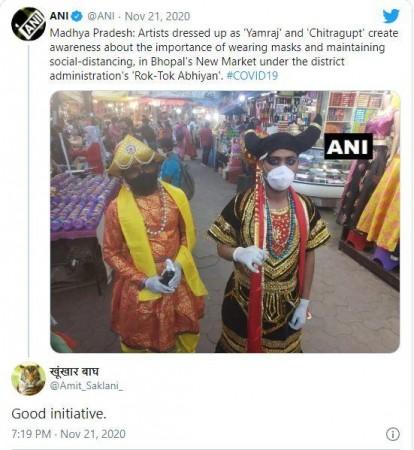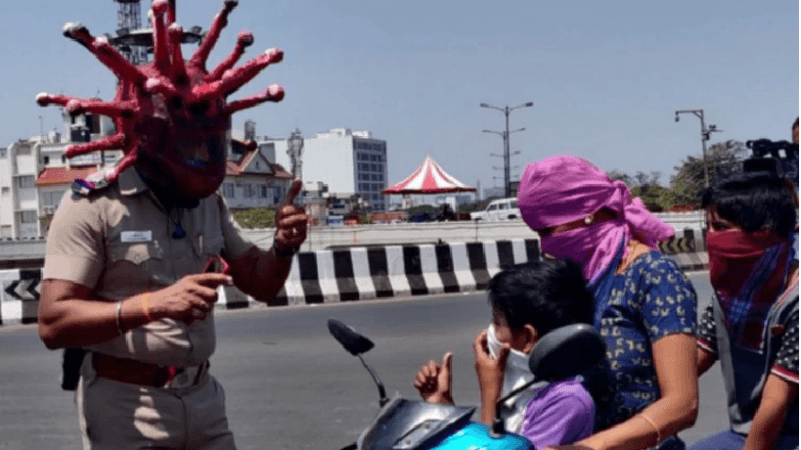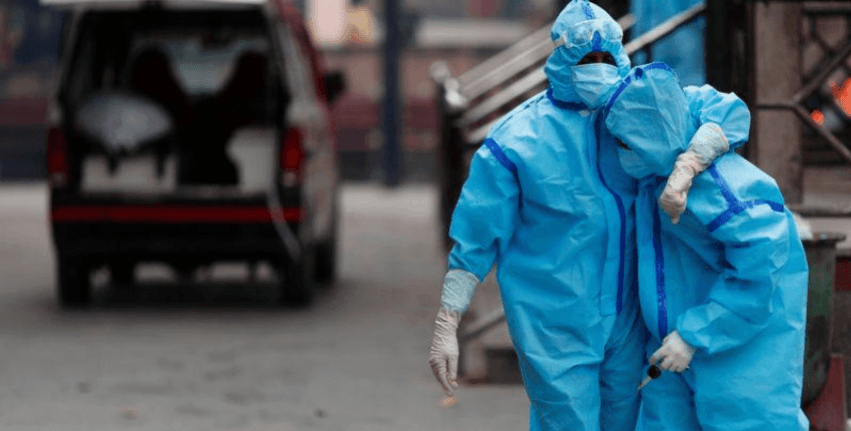Coronavirus infections across India have particularly spiked once again due to Diwali and Chatt festivities. As the country is gearing to tackle a third wave of the contagious infection that has already contracted more than 9 million people, people in small cities are contributing their bit in finding creative ways to get the message across.
In a similar instance on Saturday, artists dressed up as 'Yamraj' and 'Chitragupt' – Gods of death and punishment in Hinduism – to create awareness about the importance of wearing masks and maintaining social-distancing in Bhopal's New Market as a symbolic warning to those flouting the precautionary rules under the district administration's 'Rok-Tok Abhiyan'.

As per the Hindu beliefs, Yamraj and Chitragupta are the deities tasked with death, and to keep a record of actions committed by humans on the earth. The artists were dressed as them to veiledly warn those flouting the COVID-19 safety norms that their lackadaisical approach could prove to be fatal.
In the picture shared below, the artists could be seen asking the locals to use face masks. Some of them also sprayed sanitisers on the hands of people. They used microphones to dispel the message of maintaining social distancing and wearing masks.


However, this is not the only instance when people have dressed up in creative ways to spread the message regarding Covid-19 norms. In March, during the early days of the infection spread, Rajesh Babu, a police inspector in the southern city of Chennai, was seen wearing a specially constructed coronavirus helmet and stopping vehicles and pedestrians at checkpoints those who were not following the Covid norms, particularly wearing masks.

Local artist B. Gowtham, founder of the Chennai-based organization Art Kingdom, had come up with the helmet after noticing a lack of public awareness around the pandemic and preventative measures.
"People are not hygienic enough," Gowtham said in an interview to CNN.
"We have government orders not to come out -- but still, we're seeing people roaming here and there without proper safety equipment, without masks," he added.
Gowtham thought people weren't taking the illness seriously because it seemed invisible. So he decided to create something whereby they could actually see the virus coming toward them.
Then, he said, "people will be frightened."
Gowtham went to his nearest police station. "They've been working continuously, so I wanted to reduce their workload and make people more aware," he said. After getting their support, he got to work.
Every store was shut, so he improvised, using newspapers and tissue paper to create the helmet and its spikes -- then gave it to police inspector Babu, who loved the idea.
The helmet is covered in red spikes with bulbs on the end, just like the microscopic image of the coronavirus, which causes the disease Covid-19.

After a drop in COVID-19 cases over the past one-and-a-half months, several parts of the country is recording an increase in the positivity rate. The worst-affected region has been Delhi, where a "third wave" of the pandemic is underway.
India's COVID-19 caseload rose to 90.50 lakh, while the number of people who have recuperated from the disease surged to over 84.78 lakh pushing the national recovery rate to 93.67 per cent, according to the Union Health Ministry data on Saturday. With Gujarat witnessing a rise in Covid-19 cases, the government has decided to impose night curfew in Surat, Vadodara and Rajkot from Saturday.








